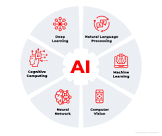AI Solutions: Transforming the Future of Business
Artificial Intelligence (AI) is no longer a futuristic concept; it has become an integral part of modern business strategies. AI solutions are transforming industries by enhancing efficiency, improving customer experiences, and enabling data-driven decision-making.
The Rise of AI in Business
Over recent years, AI has rapidly evolved from a niche technology to a mainstream business tool. Companies across various sectors are leveraging AI to gain competitive advantages and streamline operations. From automating mundane tasks to providing insights through data analysis, AI solutions are reshaping how businesses operate.
Key Benefits of AI Solutions
- Increased Efficiency: AI can automate repetitive tasks, allowing employees to focus on more strategic activities. This not only boosts productivity but also reduces operational costs.
- Enhanced Customer Experience: Through chatbots and personalised recommendations, AI improves customer interactions by providing timely and relevant responses.
- Data-Driven Insights: AI algorithms can analyse vast amounts of data swiftly, uncovering patterns and trends that inform better decision-making.
Applications Across Industries
The versatility of AI solutions means they can be applied across numerous industries:
- Healthcare: From predictive diagnostics to personalised treatment plans, AI is revolutionising patient care.
- Finance: In the financial sector, AI is used for fraud detection, risk management, and algorithmic trading.
- Retail: Retailers use AI for inventory management, demand forecasting, and enhancing the shopping experience through virtual assistants.
The Future of AI Solutions
The future holds immense potential for further integration of AI in business processes. As technology advances, we can expect even more sophisticated applications that will continue to transform industries. Businesses that embrace these innovations will likely lead in their respective fields.
The adoption of ethical guidelines and transparency in AI deployment will be crucial as companies navigate this evolving landscape. Ensuring that these technologies benefit society as a whole remains a top priority for developers and businesses alike.
In conclusion, AI solutions offer transformative opportunities for businesses willing to adapt and innovate. As we move forward into this exciting era of technological advancement, the possibilities are limitless.
Unlocking the Benefits of AI Solutions: Efficiency, Personalisation, and Proactive Problem-Solving
- Enhanced efficiency through task automation
- Improved decision-making with data-driven insights
- Personalised customer experiences through AI algorithms
- Cost savings by streamlining operations
- Increased productivity by freeing up human resources
- 24/7 availability for customer support via chatbots
- Scalability to handle large volumes of data processing
- Predictive analytics for proactive problem-solving
Challenges of AI Solutions: Job Displacement, Data Privacy, and Decision-Making Bias
Enhanced efficiency through task automation
AI solutions significantly enhance efficiency by automating repetitive and time-consuming tasks, allowing employees to focus on more strategic and creative activities. By taking over routine processes such as data entry, scheduling, and basic customer queries, AI reduces the potential for human error and speeds up operations. This not only streamlines workflows but also leads to cost savings by decreasing the need for extensive manual labour. As a result, businesses can allocate resources more effectively, improving overall productivity and enabling teams to concentrate on tasks that require human insight and innovation.
Improved decision-making with data-driven insights
AI solutions significantly enhance decision-making by providing data-driven insights that allow businesses to make informed choices. By analysing vast amounts of data quickly and accurately, AI systems can identify patterns and trends that might be missed by human analysis. This capability enables organisations to predict market changes, optimise operations, and tailor strategies to meet customer demands effectively. As a result, decision-makers are equipped with precise information that reduces uncertainty and supports strategic planning. Ultimately, the integration of AI into business processes leads to more robust and agile decision-making, fostering a competitive edge in today’s fast-paced market environment.
Personalised customer experiences through AI algorithms
AI solutions have revolutionised the way businesses interact with their customers by enabling highly personalised experiences. Through sophisticated AI algorithms, companies can analyse vast amounts of customer data to understand individual preferences, behaviours, and needs. This allows businesses to tailor their offerings and communications specifically to each customer, enhancing engagement and satisfaction. For instance, AI can provide personalised product recommendations based on a customer’s past purchases or browsing history, ensuring that every interaction feels relevant and meaningful. By delivering these customised experiences, businesses not only improve customer loyalty but also drive higher conversion rates and overall success.
Cost savings by streamlining operations
AI solutions offer significant cost savings by streamlining operations, enabling businesses to optimise their resources and reduce waste. By automating routine tasks, AI minimises the need for manual intervention, freeing up employees to focus on more strategic activities that add value to the organisation. This not only enhances productivity but also reduces labour costs. Additionally, AI-driven analytics provide insights into operational efficiencies, helping companies identify areas where processes can be improved and costs can be cut. The predictive capabilities of AI further assist in maintaining optimal inventory levels and reducing downtime through proactive maintenance, ultimately leading to substantial financial savings and a more agile business model.
Increased productivity by freeing up human resources
AI solutions offer a significant advantage in increased productivity by freeing up human resources from repetitive and time-consuming tasks. By automating these mundane activities, employees can redirect their focus towards more strategic and creative endeavours that add greater value to the business. This not only enhances overall efficiency but also fosters a work environment where human skills are optimally utilised, leading to improved innovation and performance across the organisation.
24/7 availability for customer support via chatbots
AI solutions, such as chatbots, provide a significant advantage in offering round-the-clock availability for customer support. This means that businesses can engage with their customers at any time of the day or night, ensuring prompt responses to queries and assistance whenever needed. The convenience of 24/7 customer support through chatbots not only enhances customer satisfaction but also helps in building trust and loyalty by providing instant solutions to inquiries, ultimately improving the overall customer experience.
Scalability to handle large volumes of data processing
AI solutions offer remarkable scalability, enabling businesses to efficiently handle large volumes of data processing with ease. Unlike traditional systems, AI algorithms can manage and analyse vast datasets quickly, providing valuable insights without the need for extensive manual intervention. This scalability ensures that as a business grows and accumulates more data, its AI systems can seamlessly adapt to increased demands without compromising performance or speed. Consequently, organisations can make informed decisions faster, optimise their operations, and maintain a competitive edge in an increasingly data-driven world.
Predictive analytics for proactive problem-solving
Predictive analytics, a key advantage of AI solutions, empowers businesses to engage in proactive problem-solving by anticipating potential issues before they arise. By analysing historical data and identifying patterns, AI systems can forecast future trends and detect anomalies that may indicate upcoming challenges. This foresight allows organisations to take pre-emptive measures, minimising risks and reducing the impact of unforeseen events. For instance, in supply chain management, predictive analytics can help foresee disruptions, enabling companies to adjust their logistics plans accordingly. In customer service, it can predict spikes in demand, allowing businesses to allocate resources efficiently and maintain high satisfaction levels. Ultimately, predictive analytics transforms decision-making from reactive to proactive, providing a significant strategic advantage in today’s competitive landscape.
Potential job displacement
The implementation of AI solutions in various industries poses a significant challenge in the form of potential job displacement. As AI technology advances and becomes capable of automating tasks that were traditionally performed by humans, there is an increasing risk that individuals in certain roles may find their jobs redundant. This shift can lead to job losses, particularly in sectors where routine and repetitive tasks are prevalent. While AI can enhance efficiency and productivity, it is crucial for businesses and policymakers to address the social implications of such technological advancements. This includes investing in retraining programmes and education initiatives to equip the workforce with skills that are complementary to AI, thereby ensuring a smooth transition and minimising the adverse impact on employment.
Data privacy concerns
The integration of AI solutions into business operations frequently necessitates the collection and analysis of extensive data sets, which inevitably raises significant concerns regarding data privacy and security. As AI systems process sensitive information to deliver personalised experiences or predictive analytics, the risk of data breaches and unauthorised access becomes a pressing issue. Organisations must navigate complex regulatory environments to ensure compliance with data protection laws, such as the General Data Protection Regulation (GDPR) in Europe. Additionally, maintaining transparency about how data is collected, stored, and used is crucial in building trust with consumers. The challenge lies in balancing the benefits of AI-driven insights with the imperative to safeguard individual privacy rights in an increasingly digital world.
Bias in decision-making
One significant drawback of AI solutions is the potential for bias in decision-making. AI algorithms are trained on vast datasets, and if these datasets contain biased information, the algorithms can inadvertently perpetuate and even amplify these biases. This can lead to unfair or discriminatory outcomes, particularly in critical areas such as hiring, lending, and law enforcement. For instance, if an AI system used for recruitment is trained on historical data where certain groups were underrepresented or unfairly assessed, it may continue to favour applicants from more represented groups. This not only undermines the fairness of the decision-making process but also poses ethical and legal challenges for organisations relying on AI solutions. Addressing this issue requires careful consideration of data sources and the implementation of strategies to identify and mitigate biases in AI systems.




